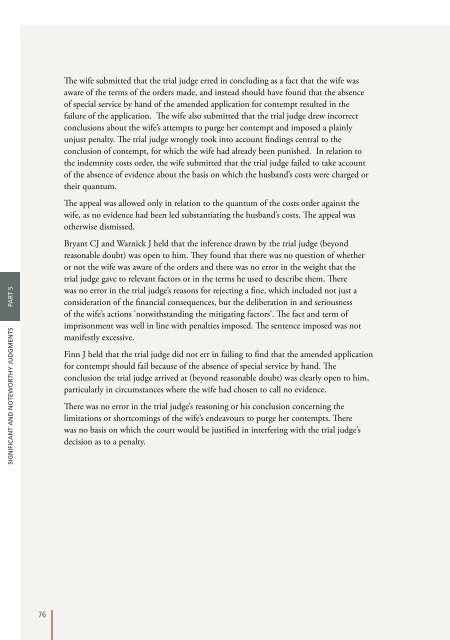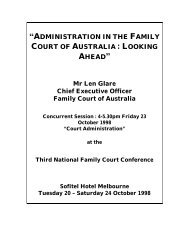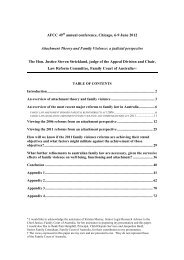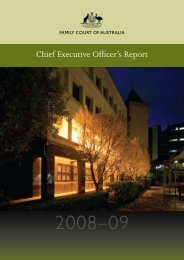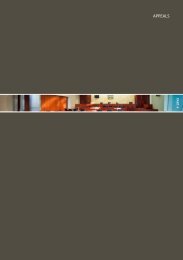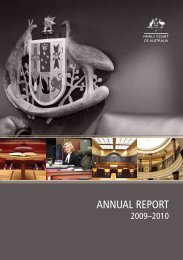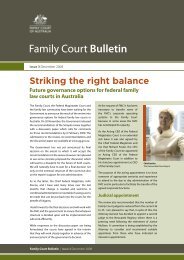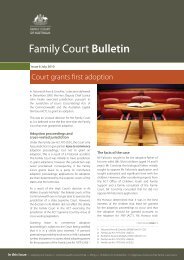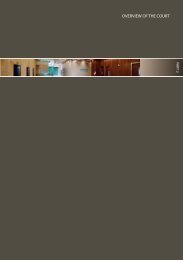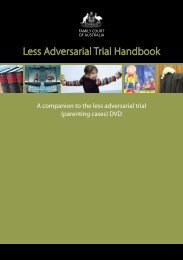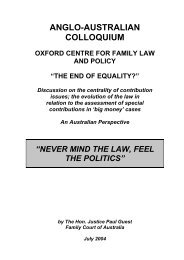Significant and Noteworthy Judgments - Family Court of Australia
Significant and Noteworthy Judgments - Family Court of Australia
Significant and Noteworthy Judgments - Family Court of Australia
Create successful ePaper yourself
Turn your PDF publications into a flip-book with our unique Google optimized e-Paper software.
The wife submitted that the trial judge erred in concluding as a fact that the wife was<br />
aware <strong>of</strong> the terms <strong>of</strong> the orders made, <strong>and</strong> instead should have found that the absence<br />
<strong>of</strong> special service by h<strong>and</strong> <strong>of</strong> the amended application for contempt resulted in the<br />
failure <strong>of</strong> the application. The wife also submitted that the trial judge drew incorrect<br />
conclusions about the wife’s attempts to purge her contempt <strong>and</strong> imposed a plainly<br />
unjust penalty. The trial judge wrongly took into account findings central to the<br />
conclusion <strong>of</strong> contempt, for which the wife had already been punished. In relation to<br />
the indemnity costs order, the wife submitted that the trial judge failed to take account<br />
<strong>of</strong> the absence <strong>of</strong> evidence about the basis on which the husb<strong>and</strong>’s costs were charged or<br />
their quantum.<br />
The appeal was allowed only in relation to the quantum <strong>of</strong> the costs order against the<br />
wife, as no evidence had been led substantiating the husb<strong>and</strong>’s costs. The appeal was<br />
otherwise dismissed.<br />
SIGNIFICANT AND NOTEWORTHY JUDGMENTS PART 5<br />
Bryant CJ <strong>and</strong> Warnick J held that the inference drawn by the trial judge (beyond<br />
reasonable doubt) was open to him. They found that there was no question <strong>of</strong> whether<br />
or not the wife was aware <strong>of</strong> the orders <strong>and</strong> there was no error in the weight that the<br />
trial judge gave to relevant factors or in the terms he used to describe them. There<br />
was no error in the trial judge’s reasons for rejecting a fine, which included not just a<br />
consideration <strong>of</strong> the financial consequences, but the deliberation in <strong>and</strong> seriousness<br />
<strong>of</strong> the wife’s actions 'notwithst<strong>and</strong>ing the mitigating factors'. The fact <strong>and</strong> term <strong>of</strong><br />
imprisonment was well in line with penalties imposed. The sentence imposed was not<br />
manifestly excessive.<br />
Finn J held that the trial judge did not err in failing to find that the amended application<br />
for contempt should fail because <strong>of</strong> the absence <strong>of</strong> special service by h<strong>and</strong>. The<br />
conclusion the trial judge arrived at (beyond reasonable doubt) was clearly open to him,<br />
particularly in circumstances where the wife had chosen to call no evidence.<br />
There was no error in the trial judge’s reasoning or his conclusion concerning the<br />
limitations or shortcomings <strong>of</strong> the wife’s endeavours to purge her contempts. There<br />
was no basis on which the court would be justified in interfering with the trial judge’s<br />
decision as to a penalty.<br />
76


